Business Law Report: Agency, Authority and Contractual Elements
VerifiedAdded on 2021/04/17
|11
|3025
|297
Report
AI Summary
This business law report examines the core principles of agency and contract law. It defines agency, differentiates between actual and apparent authority, and explores the implications of express and implied authority, referencing key cases such as Queen v. Kane, Freeman and Lockyer v Buckhurst Park Properties, and Watteau v. Fenwick. The report also investigates the incorporation of terms in contracts, including the requirements of notice and the role of contractual documents, referencing cases like Thompson v LMS Railway and Olley v Marlborough Court Hotel. Furthermore, it addresses confidentiality agreements, penalty clauses, and their enforceability under English law, including the rulings from the Cavendish Square Holding BV v Talal El Makdessi and ParkingEye Ltd v Beavis cases. This report provides a comprehensive overview of these critical aspects of business law.
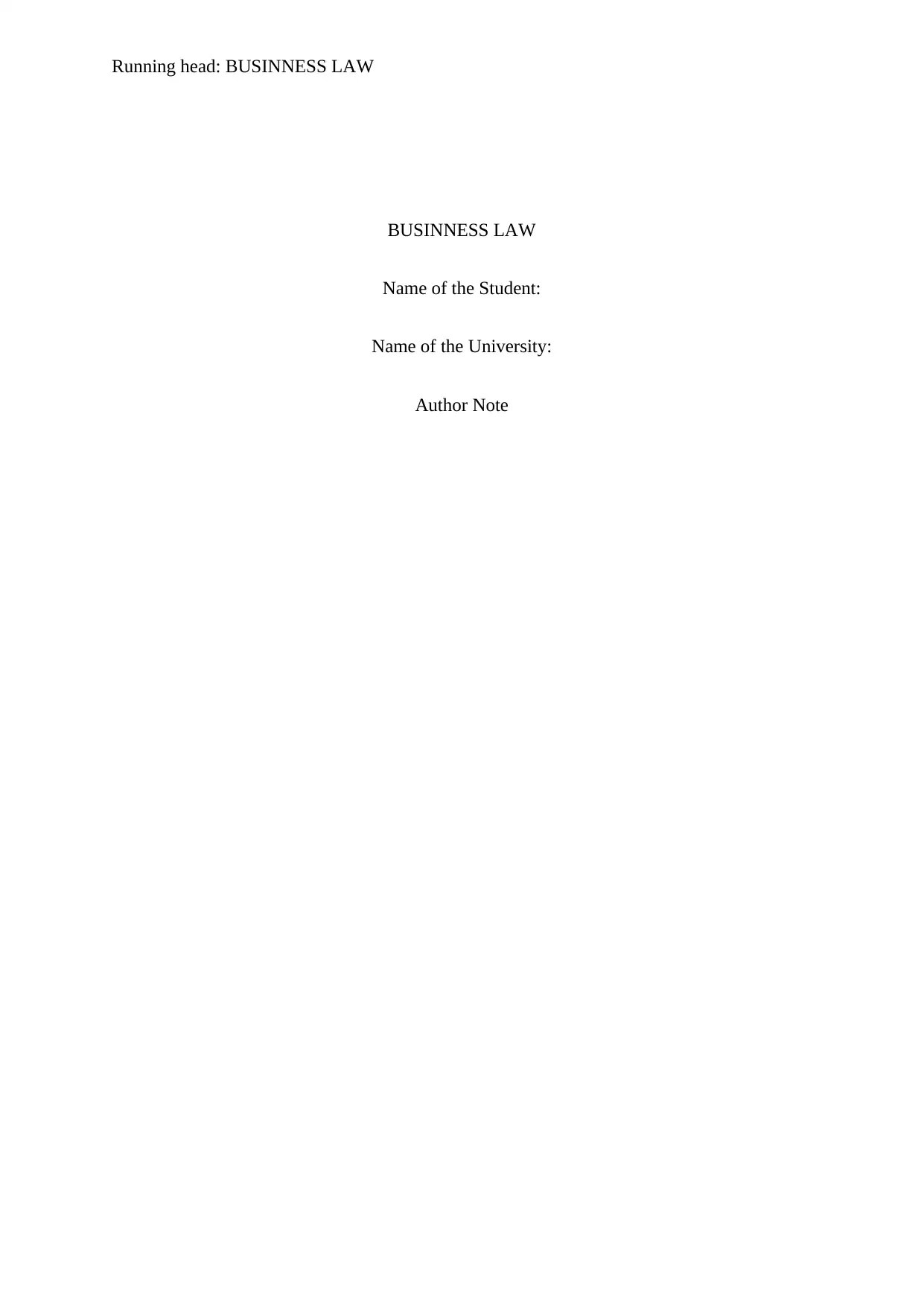
Running head: BUSINNESS LAW
BUSINNESS LAW
Name of the Student:
Name of the University:
Author Note
BUSINNESS LAW
Name of the Student:
Name of the University:
Author Note
Paraphrase This Document
Need a fresh take? Get an instant paraphrase of this document with our AI Paraphraser
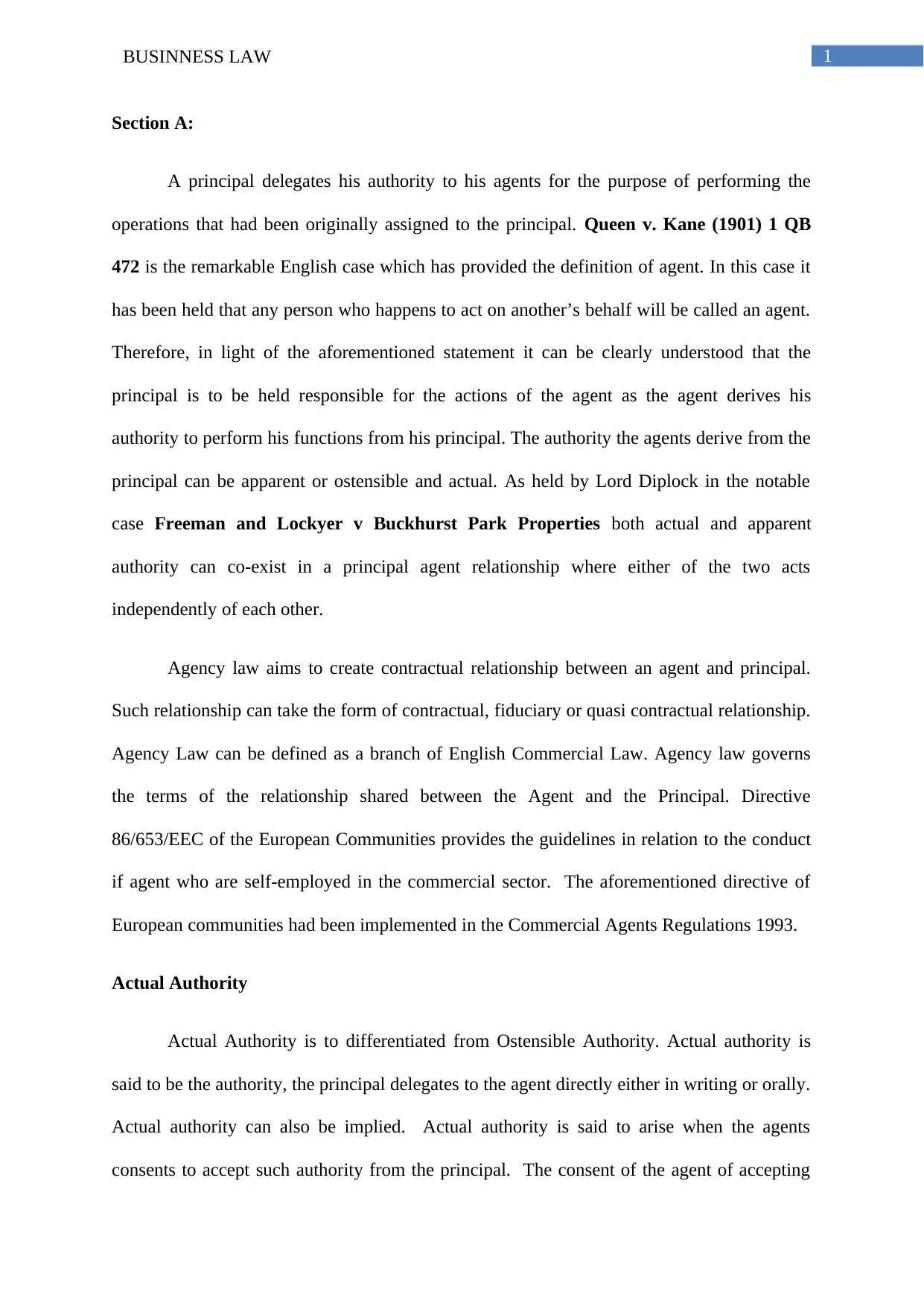
1BUSINNESS LAW
Section A:
A principal delegates his authority to his agents for the purpose of performing the
operations that had been originally assigned to the principal. Queen v. Kane (1901) 1 QB
472 is the remarkable English case which has provided the definition of agent. In this case it
has been held that any person who happens to act on another’s behalf will be called an agent.
Therefore, in light of the aforementioned statement it can be clearly understood that the
principal is to be held responsible for the actions of the agent as the agent derives his
authority to perform his functions from his principal. The authority the agents derive from the
principal can be apparent or ostensible and actual. As held by Lord Diplock in the notable
case Freeman and Lockyer v Buckhurst Park Properties both actual and apparent
authority can co-exist in a principal agent relationship where either of the two acts
independently of each other.
Agency law aims to create contractual relationship between an agent and principal.
Such relationship can take the form of contractual, fiduciary or quasi contractual relationship.
Agency Law can be defined as a branch of English Commercial Law. Agency law governs
the terms of the relationship shared between the Agent and the Principal. Directive
86/653/EEC of the European Communities provides the guidelines in relation to the conduct
if agent who are self-employed in the commercial sector. The aforementioned directive of
European communities had been implemented in the Commercial Agents Regulations 1993.
Actual Authority
Actual Authority is to differentiated from Ostensible Authority. Actual authority is
said to be the authority, the principal delegates to the agent directly either in writing or orally.
Actual authority can also be implied. Actual authority is said to arise when the agents
consents to accept such authority from the principal. The consent of the agent of accepting
Section A:
A principal delegates his authority to his agents for the purpose of performing the
operations that had been originally assigned to the principal. Queen v. Kane (1901) 1 QB
472 is the remarkable English case which has provided the definition of agent. In this case it
has been held that any person who happens to act on another’s behalf will be called an agent.
Therefore, in light of the aforementioned statement it can be clearly understood that the
principal is to be held responsible for the actions of the agent as the agent derives his
authority to perform his functions from his principal. The authority the agents derive from the
principal can be apparent or ostensible and actual. As held by Lord Diplock in the notable
case Freeman and Lockyer v Buckhurst Park Properties both actual and apparent
authority can co-exist in a principal agent relationship where either of the two acts
independently of each other.
Agency law aims to create contractual relationship between an agent and principal.
Such relationship can take the form of contractual, fiduciary or quasi contractual relationship.
Agency Law can be defined as a branch of English Commercial Law. Agency law governs
the terms of the relationship shared between the Agent and the Principal. Directive
86/653/EEC of the European Communities provides the guidelines in relation to the conduct
if agent who are self-employed in the commercial sector. The aforementioned directive of
European communities had been implemented in the Commercial Agents Regulations 1993.
Actual Authority
Actual Authority is to differentiated from Ostensible Authority. Actual authority is
said to be the authority, the principal delegates to the agent directly either in writing or orally.
Actual authority can also be implied. Actual authority is said to arise when the agents
consents to accept such authority from the principal. The consent of the agent of accepting
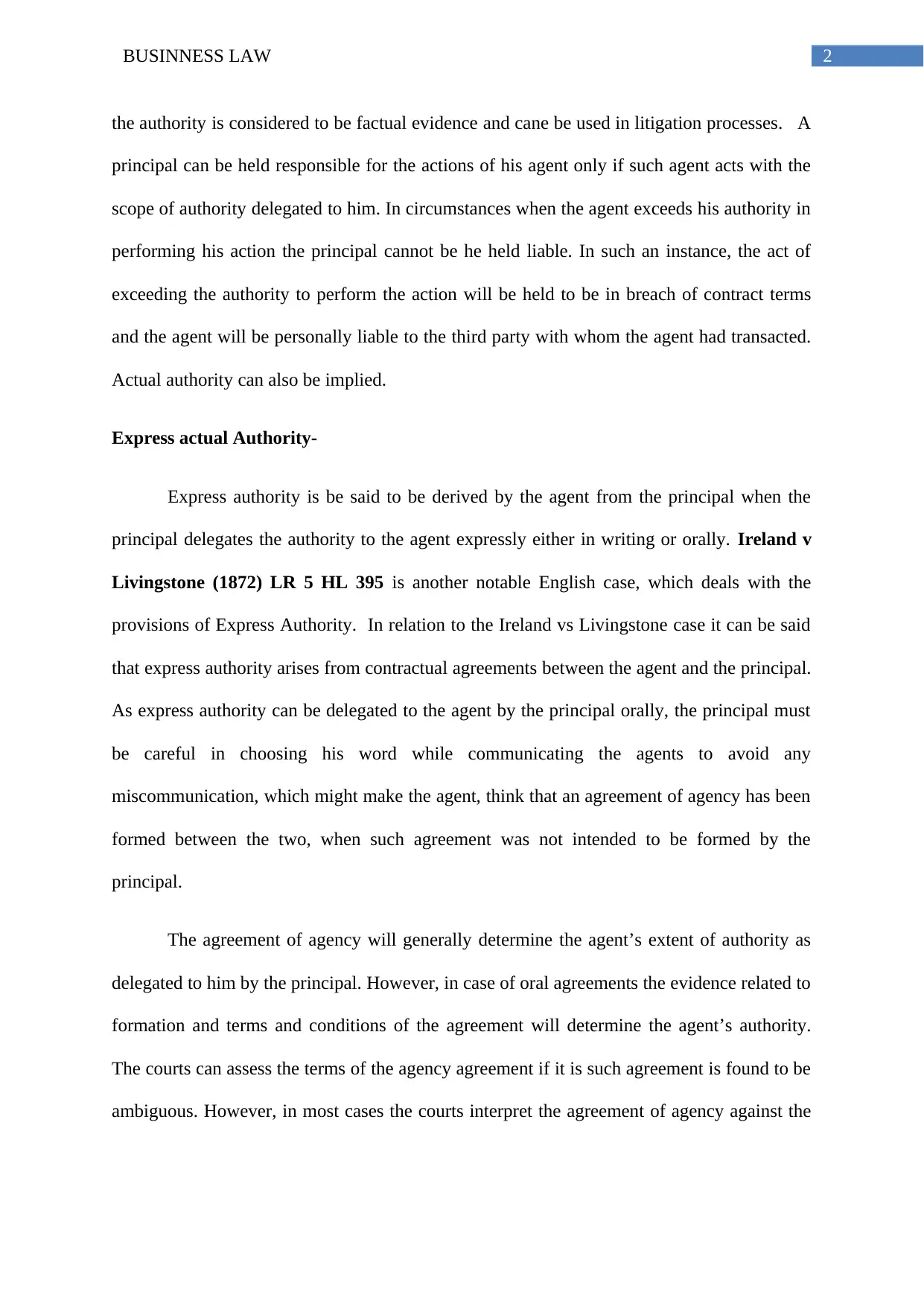
2BUSINNESS LAW
the authority is considered to be factual evidence and cane be used in litigation processes. A
principal can be held responsible for the actions of his agent only if such agent acts with the
scope of authority delegated to him. In circumstances when the agent exceeds his authority in
performing his action the principal cannot be he held liable. In such an instance, the act of
exceeding the authority to perform the action will be held to be in breach of contract terms
and the agent will be personally liable to the third party with whom the agent had transacted.
Actual authority can also be implied.
Express actual Authority-
Express authority is be said to be derived by the agent from the principal when the
principal delegates the authority to the agent expressly either in writing or orally. Ireland v
Livingstone (1872) LR 5 HL 395 is another notable English case, which deals with the
provisions of Express Authority. In relation to the Ireland vs Livingstone case it can be said
that express authority arises from contractual agreements between the agent and the principal.
As express authority can be delegated to the agent by the principal orally, the principal must
be careful in choosing his word while communicating the agents to avoid any
miscommunication, which might make the agent, think that an agreement of agency has been
formed between the two, when such agreement was not intended to be formed by the
principal.
The agreement of agency will generally determine the agent’s extent of authority as
delegated to him by the principal. However, in case of oral agreements the evidence related to
formation and terms and conditions of the agreement will determine the agent’s authority.
The courts can assess the terms of the agency agreement if it is such agreement is found to be
ambiguous. However, in most cases the courts interpret the agreement of agency against the
the authority is considered to be factual evidence and cane be used in litigation processes. A
principal can be held responsible for the actions of his agent only if such agent acts with the
scope of authority delegated to him. In circumstances when the agent exceeds his authority in
performing his action the principal cannot be he held liable. In such an instance, the act of
exceeding the authority to perform the action will be held to be in breach of contract terms
and the agent will be personally liable to the third party with whom the agent had transacted.
Actual authority can also be implied.
Express actual Authority-
Express authority is be said to be derived by the agent from the principal when the
principal delegates the authority to the agent expressly either in writing or orally. Ireland v
Livingstone (1872) LR 5 HL 395 is another notable English case, which deals with the
provisions of Express Authority. In relation to the Ireland vs Livingstone case it can be said
that express authority arises from contractual agreements between the agent and the principal.
As express authority can be delegated to the agent by the principal orally, the principal must
be careful in choosing his word while communicating the agents to avoid any
miscommunication, which might make the agent, think that an agreement of agency has been
formed between the two, when such agreement was not intended to be formed by the
principal.
The agreement of agency will generally determine the agent’s extent of authority as
delegated to him by the principal. However, in case of oral agreements the evidence related to
formation and terms and conditions of the agreement will determine the agent’s authority.
The courts can assess the terms of the agency agreement if it is such agreement is found to be
ambiguous. However, in most cases the courts interpret the agreement of agency against the
⊘ This is a preview!⊘
Do you want full access?
Subscribe today to unlock all pages.

Trusted by 1+ million students worldwide
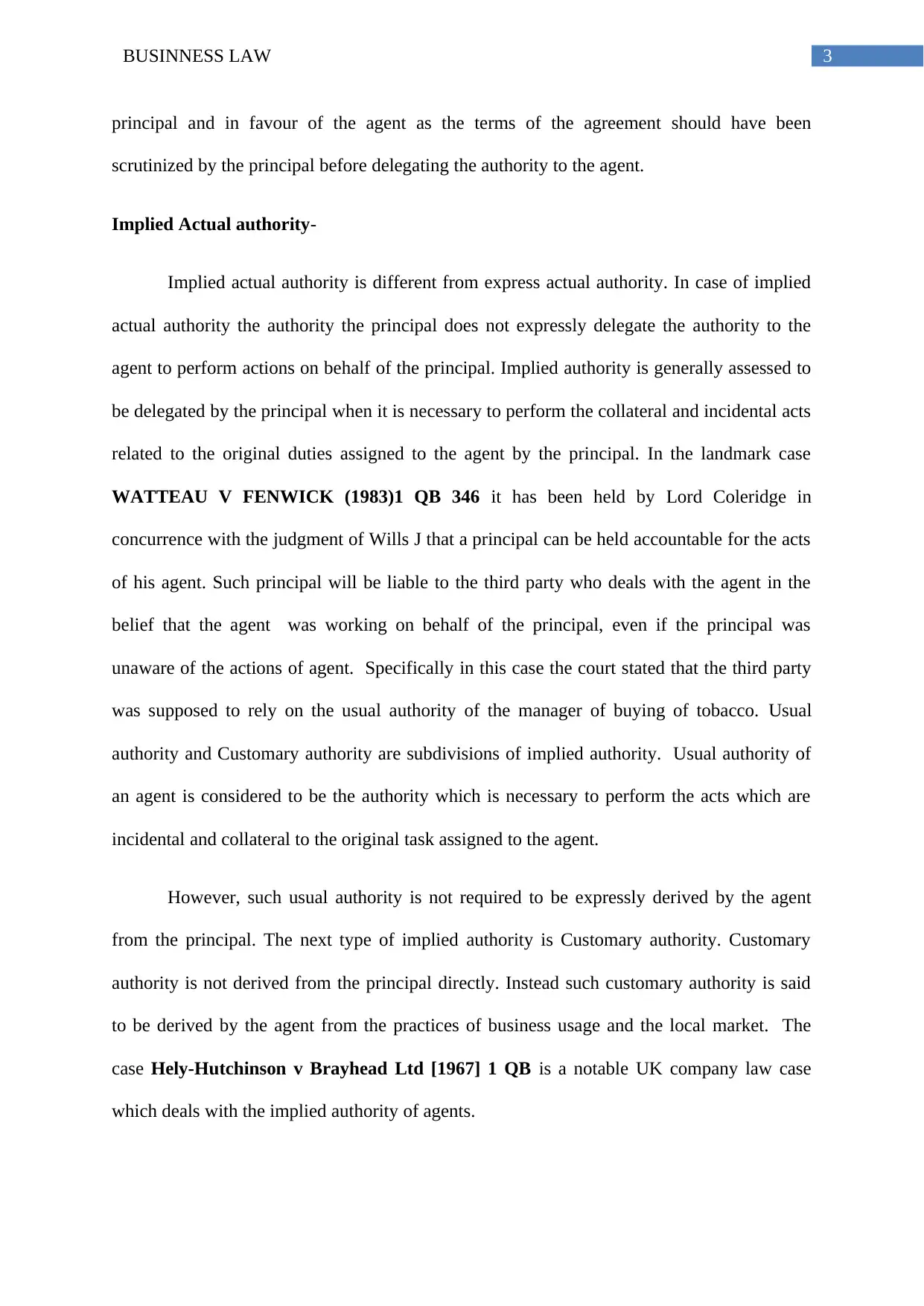
3BUSINNESS LAW
principal and in favour of the agent as the terms of the agreement should have been
scrutinized by the principal before delegating the authority to the agent.
Implied Actual authority-
Implied actual authority is different from express actual authority. In case of implied
actual authority the authority the principal does not expressly delegate the authority to the
agent to perform actions on behalf of the principal. Implied authority is generally assessed to
be delegated by the principal when it is necessary to perform the collateral and incidental acts
related to the original duties assigned to the agent by the principal. In the landmark case
WATTEAU V FENWICK (1983)1 QB 346 it has been held by Lord Coleridge in
concurrence with the judgment of Wills J that a principal can be held accountable for the acts
of his agent. Such principal will be liable to the third party who deals with the agent in the
belief that the agent was working on behalf of the principal, even if the principal was
unaware of the actions of agent. Specifically in this case the court stated that the third party
was supposed to rely on the usual authority of the manager of buying of tobacco. Usual
authority and Customary authority are subdivisions of implied authority. Usual authority of
an agent is considered to be the authority which is necessary to perform the acts which are
incidental and collateral to the original task assigned to the agent.
However, such usual authority is not required to be expressly derived by the agent
from the principal. The next type of implied authority is Customary authority. Customary
authority is not derived from the principal directly. Instead such customary authority is said
to be derived by the agent from the practices of business usage and the local market. The
case Hely-Hutchinson v Brayhead Ltd [1967] 1 QB is a notable UK company law case
which deals with the implied authority of agents.
principal and in favour of the agent as the terms of the agreement should have been
scrutinized by the principal before delegating the authority to the agent.
Implied Actual authority-
Implied actual authority is different from express actual authority. In case of implied
actual authority the authority the principal does not expressly delegate the authority to the
agent to perform actions on behalf of the principal. Implied authority is generally assessed to
be delegated by the principal when it is necessary to perform the collateral and incidental acts
related to the original duties assigned to the agent by the principal. In the landmark case
WATTEAU V FENWICK (1983)1 QB 346 it has been held by Lord Coleridge in
concurrence with the judgment of Wills J that a principal can be held accountable for the acts
of his agent. Such principal will be liable to the third party who deals with the agent in the
belief that the agent was working on behalf of the principal, even if the principal was
unaware of the actions of agent. Specifically in this case the court stated that the third party
was supposed to rely on the usual authority of the manager of buying of tobacco. Usual
authority and Customary authority are subdivisions of implied authority. Usual authority of
an agent is considered to be the authority which is necessary to perform the acts which are
incidental and collateral to the original task assigned to the agent.
However, such usual authority is not required to be expressly derived by the agent
from the principal. The next type of implied authority is Customary authority. Customary
authority is not derived from the principal directly. Instead such customary authority is said
to be derived by the agent from the practices of business usage and the local market. The
case Hely-Hutchinson v Brayhead Ltd [1967] 1 QB is a notable UK company law case
which deals with the implied authority of agents.
Paraphrase This Document
Need a fresh take? Get an instant paraphrase of this document with our AI Paraphraser
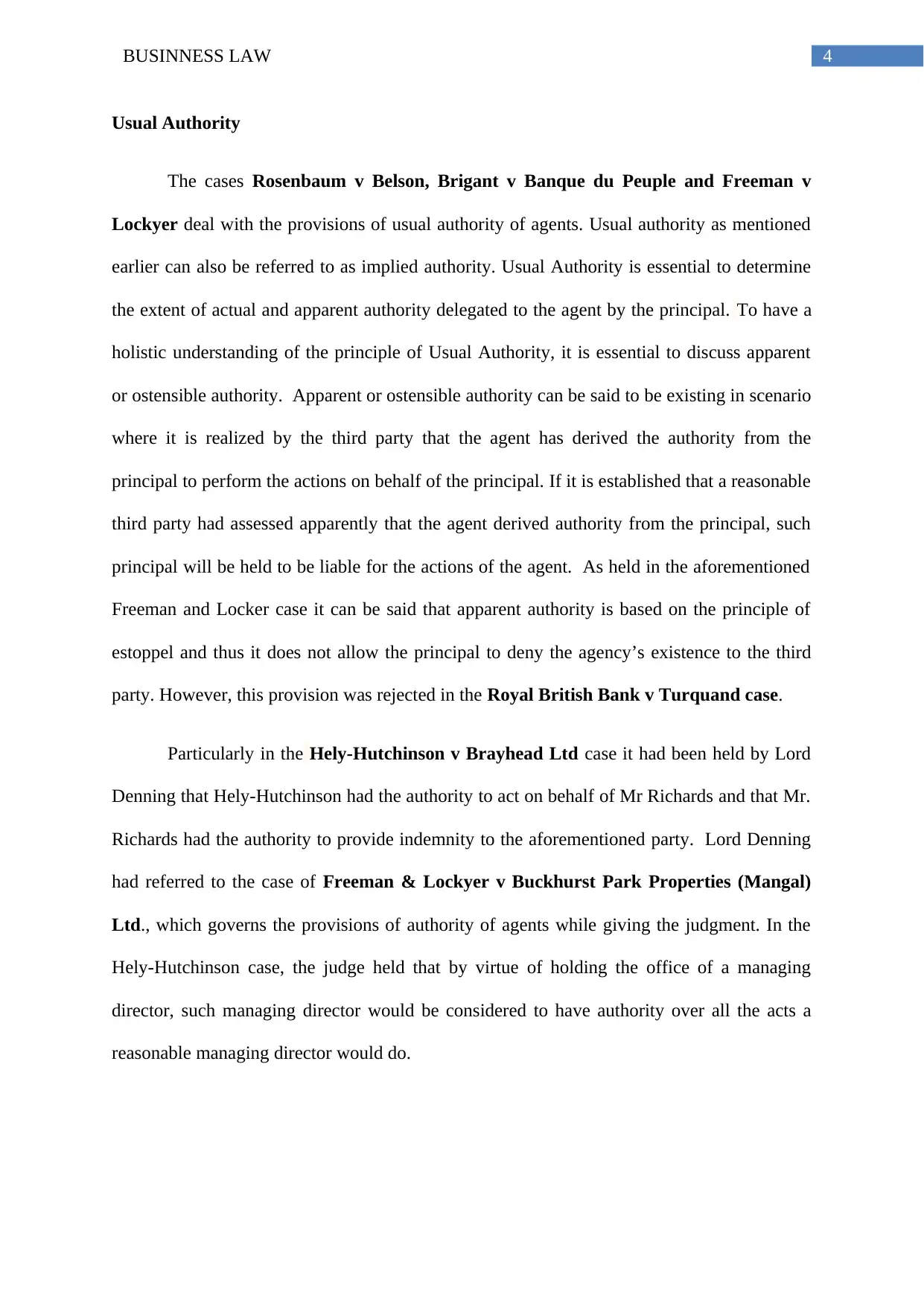
4BUSINNESS LAW
Usual Authority
The cases Rosenbaum v Belson, Brigant v Banque du Peuple and Freeman v
Lockyer deal with the provisions of usual authority of agents. Usual authority as mentioned
earlier can also be referred to as implied authority. Usual Authority is essential to determine
the extent of actual and apparent authority delegated to the agent by the principal. To have a
holistic understanding of the principle of Usual Authority, it is essential to discuss apparent
or ostensible authority. Apparent or ostensible authority can be said to be existing in scenario
where it is realized by the third party that the agent has derived the authority from the
principal to perform the actions on behalf of the principal. If it is established that a reasonable
third party had assessed apparently that the agent derived authority from the principal, such
principal will be held to be liable for the actions of the agent. As held in the aforementioned
Freeman and Locker case it can be said that apparent authority is based on the principle of
estoppel and thus it does not allow the principal to deny the agency’s existence to the third
party. However, this provision was rejected in the Royal British Bank v Turquand case.
Particularly in the Hely-Hutchinson v Brayhead Ltd case it had been held by Lord
Denning that Hely-Hutchinson had the authority to act on behalf of Mr Richards and that Mr.
Richards had the authority to provide indemnity to the aforementioned party. Lord Denning
had referred to the case of Freeman & Lockyer v Buckhurst Park Properties (Mangal)
Ltd., which governs the provisions of authority of agents while giving the judgment. In the
Hely-Hutchinson case, the judge held that by virtue of holding the office of a managing
director, such managing director would be considered to have authority over all the acts a
reasonable managing director would do.
Usual Authority
The cases Rosenbaum v Belson, Brigant v Banque du Peuple and Freeman v
Lockyer deal with the provisions of usual authority of agents. Usual authority as mentioned
earlier can also be referred to as implied authority. Usual Authority is essential to determine
the extent of actual and apparent authority delegated to the agent by the principal. To have a
holistic understanding of the principle of Usual Authority, it is essential to discuss apparent
or ostensible authority. Apparent or ostensible authority can be said to be existing in scenario
where it is realized by the third party that the agent has derived the authority from the
principal to perform the actions on behalf of the principal. If it is established that a reasonable
third party had assessed apparently that the agent derived authority from the principal, such
principal will be held to be liable for the actions of the agent. As held in the aforementioned
Freeman and Locker case it can be said that apparent authority is based on the principle of
estoppel and thus it does not allow the principal to deny the agency’s existence to the third
party. However, this provision was rejected in the Royal British Bank v Turquand case.
Particularly in the Hely-Hutchinson v Brayhead Ltd case it had been held by Lord
Denning that Hely-Hutchinson had the authority to act on behalf of Mr Richards and that Mr.
Richards had the authority to provide indemnity to the aforementioned party. Lord Denning
had referred to the case of Freeman & Lockyer v Buckhurst Park Properties (Mangal)
Ltd., which governs the provisions of authority of agents while giving the judgment. In the
Hely-Hutchinson case, the judge held that by virtue of holding the office of a managing
director, such managing director would be considered to have authority over all the acts a
reasonable managing director would do.
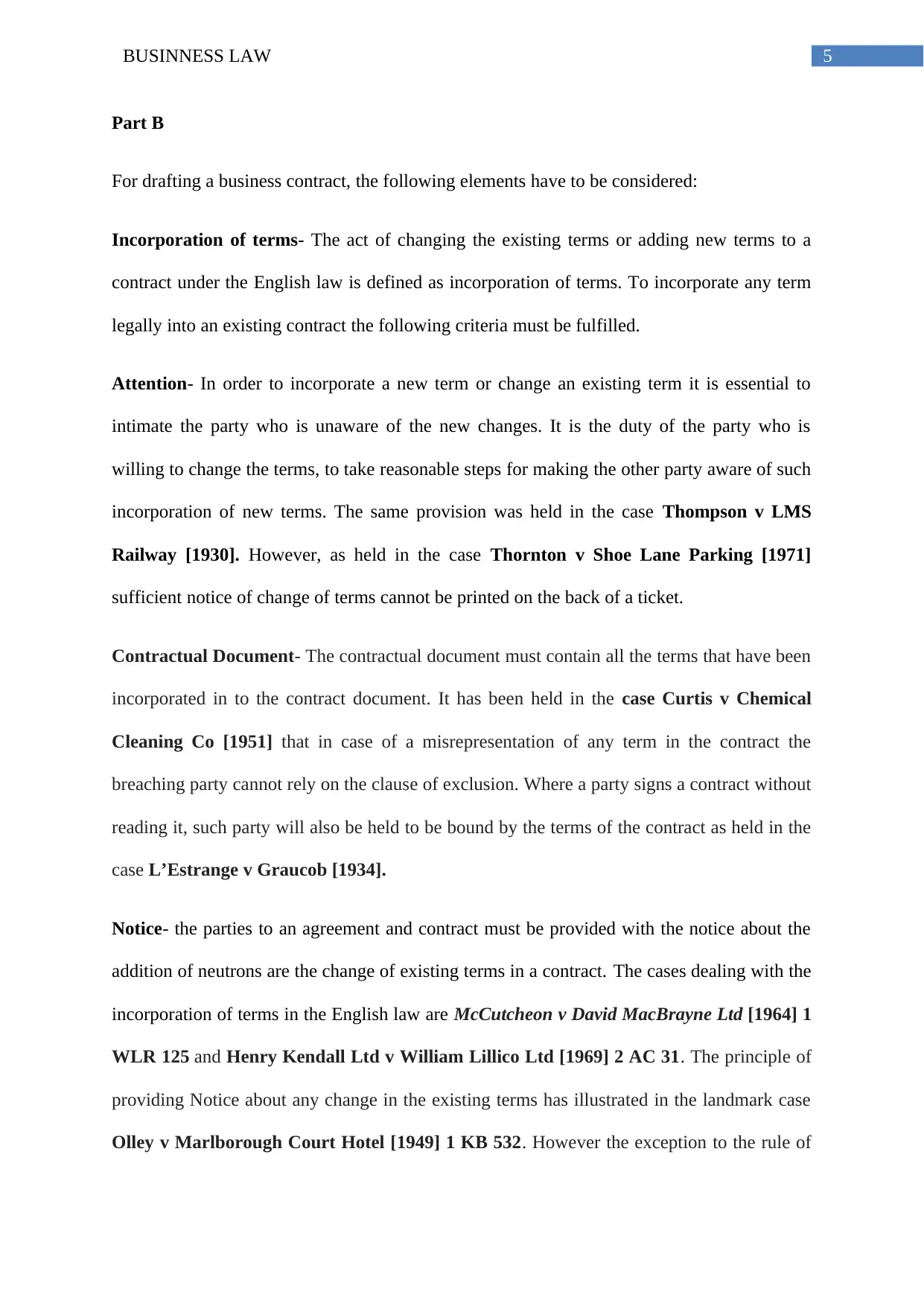
5BUSINNESS LAW
Part B
For drafting a business contract, the following elements have to be considered:
Incorporation of terms- The act of changing the existing terms or adding new terms to a
contract under the English law is defined as incorporation of terms. To incorporate any term
legally into an existing contract the following criteria must be fulfilled.
Attention- In order to incorporate a new term or change an existing term it is essential to
intimate the party who is unaware of the new changes. It is the duty of the party who is
willing to change the terms, to take reasonable steps for making the other party aware of such
incorporation of new terms. The same provision was held in the case Thompson v LMS
Railway [1930]. However, as held in the case Thornton v Shoe Lane Parking [1971]
sufficient notice of change of terms cannot be printed on the back of a ticket.
Contractual Document- The contractual document must contain all the terms that have been
incorporated in to the contract document. It has been held in the case Curtis v Chemical
Cleaning Co [1951] that in case of a misrepresentation of any term in the contract the
breaching party cannot rely on the clause of exclusion. Where a party signs a contract without
reading it, such party will also be held to be bound by the terms of the contract as held in the
case L’Estrange v Graucob [1934].
Notice- the parties to an agreement and contract must be provided with the notice about the
addition of neutrons are the change of existing terms in a contract. The cases dealing with the
incorporation of terms in the English law are McCutcheon v David MacBrayne Ltd [1964] 1
WLR 125 and Henry Kendall Ltd v William Lillico Ltd [1969] 2 AC 31. The principle of
providing Notice about any change in the existing terms has illustrated in the landmark case
Olley v Marlborough Court Hotel [1949] 1 KB 532. However the exception to the rule of
Part B
For drafting a business contract, the following elements have to be considered:
Incorporation of terms- The act of changing the existing terms or adding new terms to a
contract under the English law is defined as incorporation of terms. To incorporate any term
legally into an existing contract the following criteria must be fulfilled.
Attention- In order to incorporate a new term or change an existing term it is essential to
intimate the party who is unaware of the new changes. It is the duty of the party who is
willing to change the terms, to take reasonable steps for making the other party aware of such
incorporation of new terms. The same provision was held in the case Thompson v LMS
Railway [1930]. However, as held in the case Thornton v Shoe Lane Parking [1971]
sufficient notice of change of terms cannot be printed on the back of a ticket.
Contractual Document- The contractual document must contain all the terms that have been
incorporated in to the contract document. It has been held in the case Curtis v Chemical
Cleaning Co [1951] that in case of a misrepresentation of any term in the contract the
breaching party cannot rely on the clause of exclusion. Where a party signs a contract without
reading it, such party will also be held to be bound by the terms of the contract as held in the
case L’Estrange v Graucob [1934].
Notice- the parties to an agreement and contract must be provided with the notice about the
addition of neutrons are the change of existing terms in a contract. The cases dealing with the
incorporation of terms in the English law are McCutcheon v David MacBrayne Ltd [1964] 1
WLR 125 and Henry Kendall Ltd v William Lillico Ltd [1969] 2 AC 31. The principle of
providing Notice about any change in the existing terms has illustrated in the landmark case
Olley v Marlborough Court Hotel [1949] 1 KB 532. However the exception to the rule of
⊘ This is a preview!⊘
Do you want full access?
Subscribe today to unlock all pages.

Trusted by 1+ million students worldwide
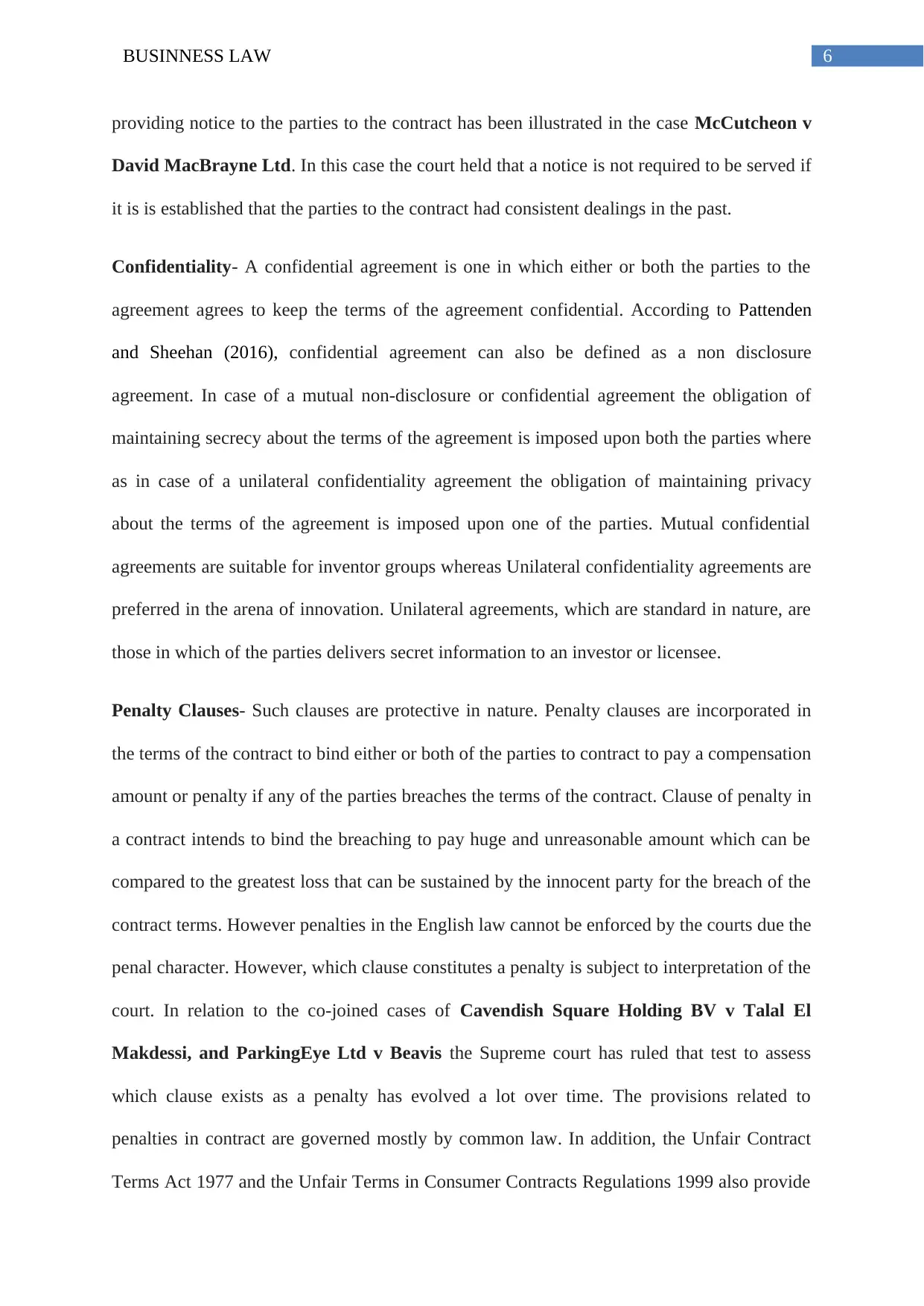
6BUSINNESS LAW
providing notice to the parties to the contract has been illustrated in the case McCutcheon v
David MacBrayne Ltd. In this case the court held that a notice is not required to be served if
it is is established that the parties to the contract had consistent dealings in the past.
Confidentiality- A confidential agreement is one in which either or both the parties to the
agreement agrees to keep the terms of the agreement confidential. According to Pattenden
and Sheehan (2016), confidential agreement can also be defined as a non disclosure
agreement. In case of a mutual non-disclosure or confidential agreement the obligation of
maintaining secrecy about the terms of the agreement is imposed upon both the parties where
as in case of a unilateral confidentiality agreement the obligation of maintaining privacy
about the terms of the agreement is imposed upon one of the parties. Mutual confidential
agreements are suitable for inventor groups whereas Unilateral confidentiality agreements are
preferred in the arena of innovation. Unilateral agreements, which are standard in nature, are
those in which of the parties delivers secret information to an investor or licensee.
Penalty Clauses- Such clauses are protective in nature. Penalty clauses are incorporated in
the terms of the contract to bind either or both of the parties to contract to pay a compensation
amount or penalty if any of the parties breaches the terms of the contract. Clause of penalty in
a contract intends to bind the breaching to pay huge and unreasonable amount which can be
compared to the greatest loss that can be sustained by the innocent party for the breach of the
contract terms. However penalties in the English law cannot be enforced by the courts due the
penal character. However, which clause constitutes a penalty is subject to interpretation of the
court. In relation to the co-joined cases of Cavendish Square Holding BV v Talal El
Makdessi, and ParkingEye Ltd v Beavis the Supreme court has ruled that test to assess
which clause exists as a penalty has evolved a lot over time. The provisions related to
penalties in contract are governed mostly by common law. In addition, the Unfair Contract
Terms Act 1977 and the Unfair Terms in Consumer Contracts Regulations 1999 also provide
providing notice to the parties to the contract has been illustrated in the case McCutcheon v
David MacBrayne Ltd. In this case the court held that a notice is not required to be served if
it is is established that the parties to the contract had consistent dealings in the past.
Confidentiality- A confidential agreement is one in which either or both the parties to the
agreement agrees to keep the terms of the agreement confidential. According to Pattenden
and Sheehan (2016), confidential agreement can also be defined as a non disclosure
agreement. In case of a mutual non-disclosure or confidential agreement the obligation of
maintaining secrecy about the terms of the agreement is imposed upon both the parties where
as in case of a unilateral confidentiality agreement the obligation of maintaining privacy
about the terms of the agreement is imposed upon one of the parties. Mutual confidential
agreements are suitable for inventor groups whereas Unilateral confidentiality agreements are
preferred in the arena of innovation. Unilateral agreements, which are standard in nature, are
those in which of the parties delivers secret information to an investor or licensee.
Penalty Clauses- Such clauses are protective in nature. Penalty clauses are incorporated in
the terms of the contract to bind either or both of the parties to contract to pay a compensation
amount or penalty if any of the parties breaches the terms of the contract. Clause of penalty in
a contract intends to bind the breaching to pay huge and unreasonable amount which can be
compared to the greatest loss that can be sustained by the innocent party for the breach of the
contract terms. However penalties in the English law cannot be enforced by the courts due the
penal character. However, which clause constitutes a penalty is subject to interpretation of the
court. In relation to the co-joined cases of Cavendish Square Holding BV v Talal El
Makdessi, and ParkingEye Ltd v Beavis the Supreme court has ruled that test to assess
which clause exists as a penalty has evolved a lot over time. The provisions related to
penalties in contract are governed mostly by common law. In addition, the Unfair Contract
Terms Act 1977 and the Unfair Terms in Consumer Contracts Regulations 1999 also provide
Paraphrase This Document
Need a fresh take? Get an instant paraphrase of this document with our AI Paraphraser
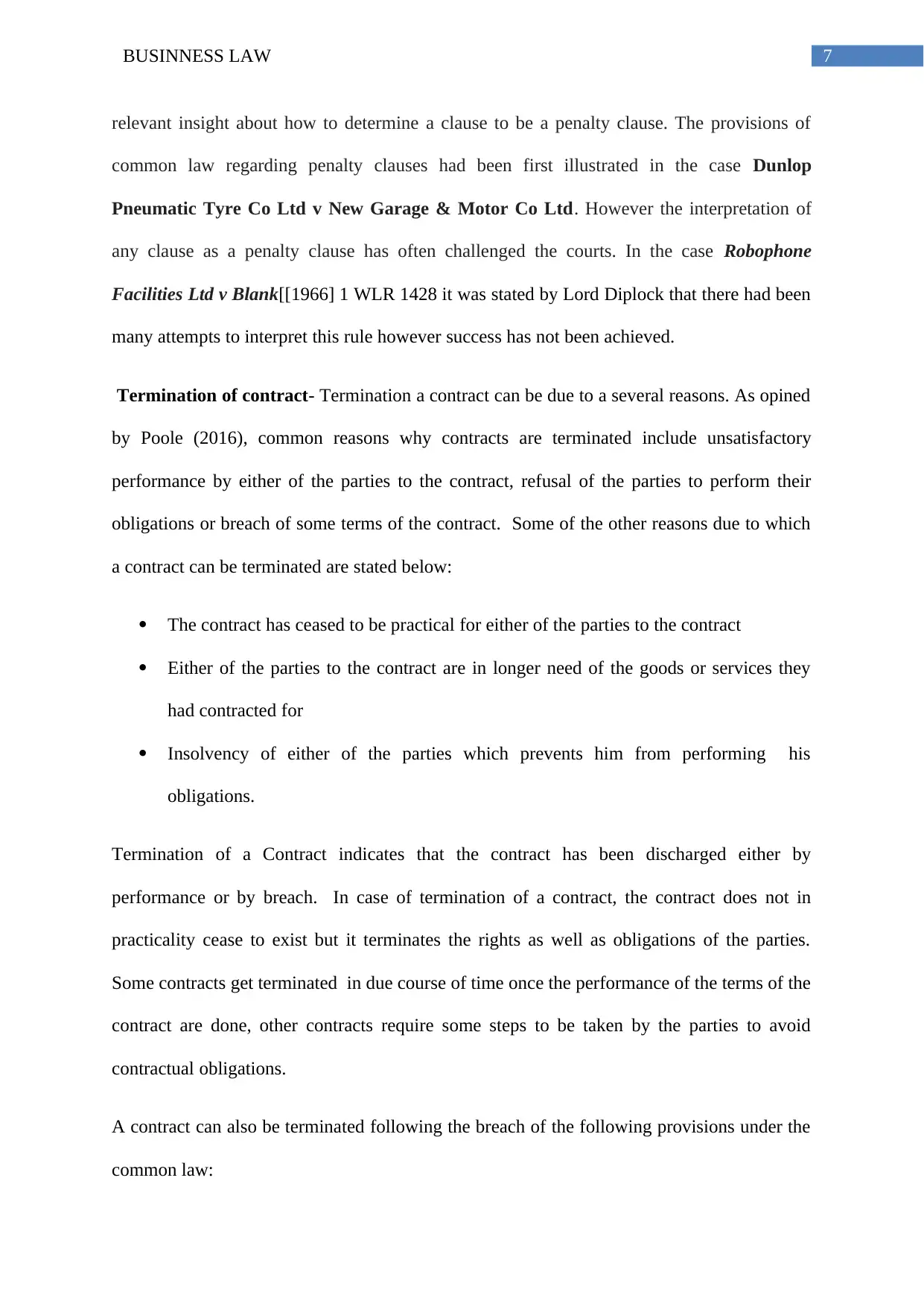
7BUSINNESS LAW
relevant insight about how to determine a clause to be a penalty clause. The provisions of
common law regarding penalty clauses had been first illustrated in the case Dunlop
Pneumatic Tyre Co Ltd v New Garage & Motor Co Ltd. However the interpretation of
any clause as a penalty clause has often challenged the courts. In the case Robophone
Facilities Ltd v Blank[[1966] 1 WLR 1428 it was stated by Lord Diplock that there had been
many attempts to interpret this rule however success has not been achieved.
Termination of contract- Termination a contract can be due to a several reasons. As opined
by Poole (2016), common reasons why contracts are terminated include unsatisfactory
performance by either of the parties to the contract, refusal of the parties to perform their
obligations or breach of some terms of the contract. Some of the other reasons due to which
a contract can be terminated are stated below:
The contract has ceased to be practical for either of the parties to the contract
Either of the parties to the contract are in longer need of the goods or services they
had contracted for
Insolvency of either of the parties which prevents him from performing his
obligations.
Termination of a Contract indicates that the contract has been discharged either by
performance or by breach. In case of termination of a contract, the contract does not in
practicality cease to exist but it terminates the rights as well as obligations of the parties.
Some contracts get terminated in due course of time once the performance of the terms of the
contract are done, other contracts require some steps to be taken by the parties to avoid
contractual obligations.
A contract can also be terminated following the breach of the following provisions under the
common law:
relevant insight about how to determine a clause to be a penalty clause. The provisions of
common law regarding penalty clauses had been first illustrated in the case Dunlop
Pneumatic Tyre Co Ltd v New Garage & Motor Co Ltd. However the interpretation of
any clause as a penalty clause has often challenged the courts. In the case Robophone
Facilities Ltd v Blank[[1966] 1 WLR 1428 it was stated by Lord Diplock that there had been
many attempts to interpret this rule however success has not been achieved.
Termination of contract- Termination a contract can be due to a several reasons. As opined
by Poole (2016), common reasons why contracts are terminated include unsatisfactory
performance by either of the parties to the contract, refusal of the parties to perform their
obligations or breach of some terms of the contract. Some of the other reasons due to which
a contract can be terminated are stated below:
The contract has ceased to be practical for either of the parties to the contract
Either of the parties to the contract are in longer need of the goods or services they
had contracted for
Insolvency of either of the parties which prevents him from performing his
obligations.
Termination of a Contract indicates that the contract has been discharged either by
performance or by breach. In case of termination of a contract, the contract does not in
practicality cease to exist but it terminates the rights as well as obligations of the parties.
Some contracts get terminated in due course of time once the performance of the terms of the
contract are done, other contracts require some steps to be taken by the parties to avoid
contractual obligations.
A contract can also be terminated following the breach of the following provisions under the
common law:
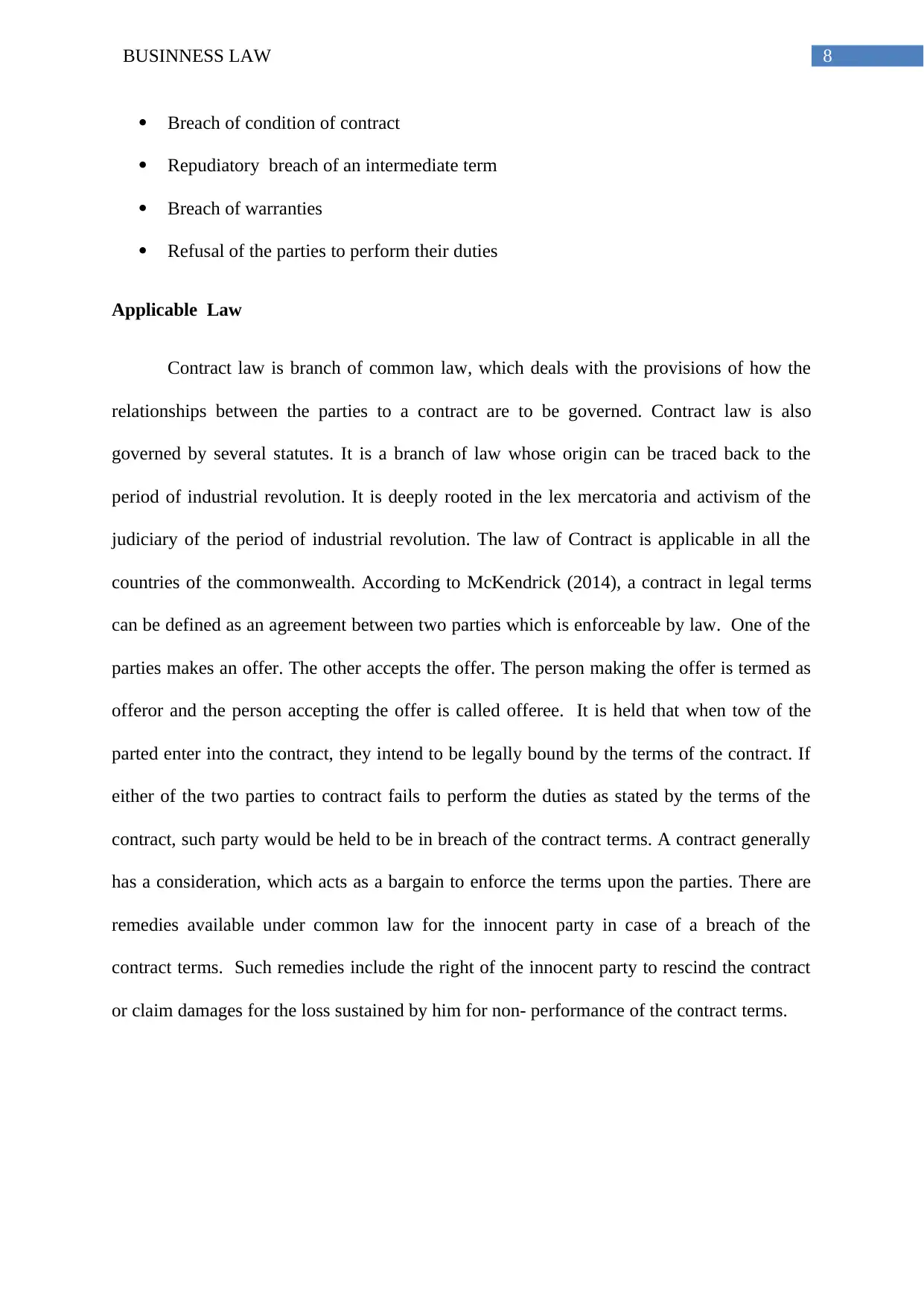
8BUSINNESS LAW
Breach of condition of contract
Repudiatory breach of an intermediate term
Breach of warranties
Refusal of the parties to perform their duties
Applicable Law
Contract law is branch of common law, which deals with the provisions of how the
relationships between the parties to a contract are to be governed. Contract law is also
governed by several statutes. It is a branch of law whose origin can be traced back to the
period of industrial revolution. It is deeply rooted in the lex mercatoria and activism of the
judiciary of the period of industrial revolution. The law of Contract is applicable in all the
countries of the commonwealth. According to McKendrick (2014), a contract in legal terms
can be defined as an agreement between two parties which is enforceable by law. One of the
parties makes an offer. The other accepts the offer. The person making the offer is termed as
offeror and the person accepting the offer is called offeree. It is held that when tow of the
parted enter into the contract, they intend to be legally bound by the terms of the contract. If
either of the two parties to contract fails to perform the duties as stated by the terms of the
contract, such party would be held to be in breach of the contract terms. A contract generally
has a consideration, which acts as a bargain to enforce the terms upon the parties. There are
remedies available under common law for the innocent party in case of a breach of the
contract terms. Such remedies include the right of the innocent party to rescind the contract
or claim damages for the loss sustained by him for non- performance of the contract terms.
Breach of condition of contract
Repudiatory breach of an intermediate term
Breach of warranties
Refusal of the parties to perform their duties
Applicable Law
Contract law is branch of common law, which deals with the provisions of how the
relationships between the parties to a contract are to be governed. Contract law is also
governed by several statutes. It is a branch of law whose origin can be traced back to the
period of industrial revolution. It is deeply rooted in the lex mercatoria and activism of the
judiciary of the period of industrial revolution. The law of Contract is applicable in all the
countries of the commonwealth. According to McKendrick (2014), a contract in legal terms
can be defined as an agreement between two parties which is enforceable by law. One of the
parties makes an offer. The other accepts the offer. The person making the offer is termed as
offeror and the person accepting the offer is called offeree. It is held that when tow of the
parted enter into the contract, they intend to be legally bound by the terms of the contract. If
either of the two parties to contract fails to perform the duties as stated by the terms of the
contract, such party would be held to be in breach of the contract terms. A contract generally
has a consideration, which acts as a bargain to enforce the terms upon the parties. There are
remedies available under common law for the innocent party in case of a breach of the
contract terms. Such remedies include the right of the innocent party to rescind the contract
or claim damages for the loss sustained by him for non- performance of the contract terms.
⊘ This is a preview!⊘
Do you want full access?
Subscribe today to unlock all pages.

Trusted by 1+ million students worldwide
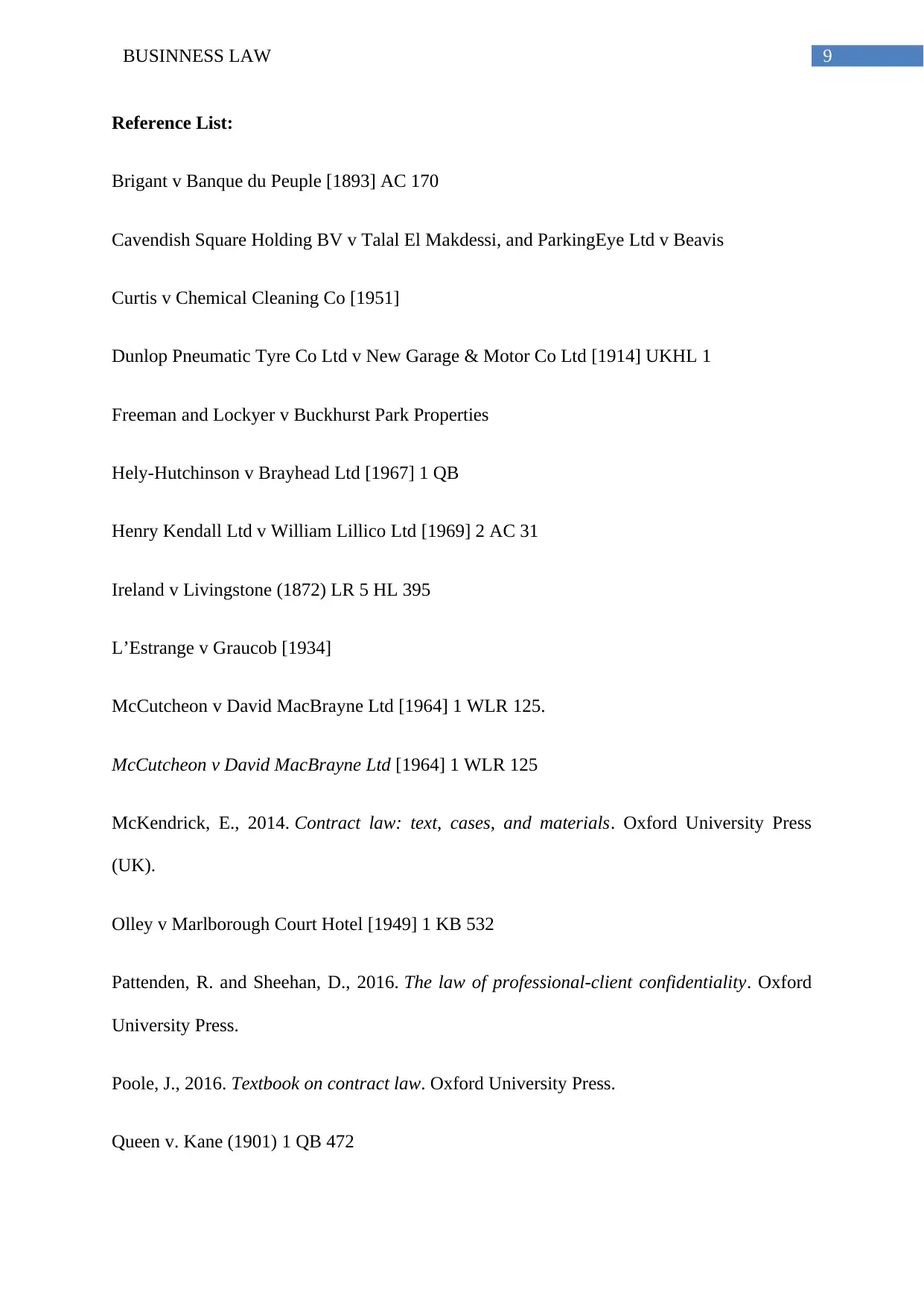
9BUSINNESS LAW
Reference List:
Brigant v Banque du Peuple [1893] AC 170
Cavendish Square Holding BV v Talal El Makdessi, and ParkingEye Ltd v Beavis
Curtis v Chemical Cleaning Co [1951]
Dunlop Pneumatic Tyre Co Ltd v New Garage & Motor Co Ltd [1914] UKHL 1
Freeman and Lockyer v Buckhurst Park Properties
Hely-Hutchinson v Brayhead Ltd [1967] 1 QB
Henry Kendall Ltd v William Lillico Ltd [1969] 2 AC 31
Ireland v Livingstone (1872) LR 5 HL 395
L’Estrange v Graucob [1934]
McCutcheon v David MacBrayne Ltd [1964] 1 WLR 125.
McCutcheon v David MacBrayne Ltd [1964] 1 WLR 125
McKendrick, E., 2014. Contract law: text, cases, and materials. Oxford University Press
(UK).
Olley v Marlborough Court Hotel [1949] 1 KB 532
Pattenden, R. and Sheehan, D., 2016. The law of professional-client confidentiality. Oxford
University Press.
Poole, J., 2016. Textbook on contract law. Oxford University Press.
Queen v. Kane (1901) 1 QB 472
Reference List:
Brigant v Banque du Peuple [1893] AC 170
Cavendish Square Holding BV v Talal El Makdessi, and ParkingEye Ltd v Beavis
Curtis v Chemical Cleaning Co [1951]
Dunlop Pneumatic Tyre Co Ltd v New Garage & Motor Co Ltd [1914] UKHL 1
Freeman and Lockyer v Buckhurst Park Properties
Hely-Hutchinson v Brayhead Ltd [1967] 1 QB
Henry Kendall Ltd v William Lillico Ltd [1969] 2 AC 31
Ireland v Livingstone (1872) LR 5 HL 395
L’Estrange v Graucob [1934]
McCutcheon v David MacBrayne Ltd [1964] 1 WLR 125.
McCutcheon v David MacBrayne Ltd [1964] 1 WLR 125
McKendrick, E., 2014. Contract law: text, cases, and materials. Oxford University Press
(UK).
Olley v Marlborough Court Hotel [1949] 1 KB 532
Pattenden, R. and Sheehan, D., 2016. The law of professional-client confidentiality. Oxford
University Press.
Poole, J., 2016. Textbook on contract law. Oxford University Press.
Queen v. Kane (1901) 1 QB 472
Paraphrase This Document
Need a fresh take? Get an instant paraphrase of this document with our AI Paraphraser

10BUSINNESS LAW
Robophone Facilities Ltd v Blank[[1966] 1 WLR 1428
Rosenbaum v Belson [1900] 2 Ch 267
Thompson v LMS Railway [1930].
Thornton v Shoe Lane Parking [1971]
WATTEAU V FENWICK (1983)1 QB 346
Robophone Facilities Ltd v Blank[[1966] 1 WLR 1428
Rosenbaum v Belson [1900] 2 Ch 267
Thompson v LMS Railway [1930].
Thornton v Shoe Lane Parking [1971]
WATTEAU V FENWICK (1983)1 QB 346
1 out of 11
Related Documents
Your All-in-One AI-Powered Toolkit for Academic Success.
+13062052269
info@desklib.com
Available 24*7 on WhatsApp / Email
![[object Object]](/_next/static/media/star-bottom.7253800d.svg)
Unlock your academic potential
Copyright © 2020–2026 A2Z Services. All Rights Reserved. Developed and managed by ZUCOL.





